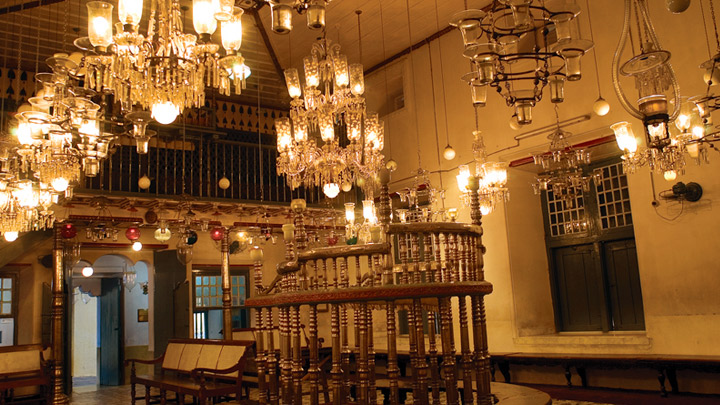The Paradesi Synagogue, located in the heart of Mattancherry in Kochi (Cochin), Kerala, India, stands as an enduring symbol of the region’s rich and diverse cultural history. This historic synagogue, also known as the Mattancherry Synagogue, is a testament to the Jewish community’s legacy in Kerala, and it holds a special place in the cultural tapestry of the region. In this article, we will explore the significance and heritage of the Paradesi Synagogue.
Historical Legacy
The Paradesi Synagogue has a storied history that dates back many centuries:
- Jewish Settlement in Kerala: Jews are believed to have settled in Kerala’s coastal areas, including Kochi, over a thousand years ago. Their arrival is attributed to trade relations with the region’s rulers.
- Synagogue Construction: The Paradesi Synagogue was originally constructed in 1568 by the Malabar Yehudan (Kerala Jews) community. The term “Paradesi” means “foreigner” in the local Malayalam language, signifying the synagogue’s role as a place of worship for the immigrant Jewish community.
- Dutch Influence: The synagogue underwent renovations during the Dutch colonial period in the 17th century. It was during this time that some of its distinctive features, including hand-painted Chinese tiles and the elegant Belgian chandeliers, were added.
Architectural Beauty
The Paradesi Synagogue is renowned for its architectural and artistic features:
- Wooden Interiors: The synagogue boasts intricately carved wooden interiors, with detailed craftsmanship that reflects a blend of Indian and Middle Eastern influences.
- Chandeliers: The stunning Belgian chandeliers that adorn the synagogue’s interior are a sight to behold. These chandeliers are made of brass and are adorned with hundreds of sparkling crystals.
- Hand-Painted Tiles: The floor of the synagogue is covered with exquisite hand-painted Chinese porcelain tiles. Each tile tells a unique story through its vibrant colors and intricate patterns.
Historical Artifacts
The Paradesi Synagogue houses a collection of historical artifacts:
- Copper Plates: The synagogue possesses copper plates that document the community’s history and the privileges granted to them by local rulers.
- Judaica: Visitors can also view various Judaica items, including Torah scrolls, antique prayer books, and silver and gold jewelry.
Visiting the Paradesi Synagogue
- Location: The Paradesi Synagogue is located in the Mattancherry neighborhood of Kochi, Kerala, India. It is easily accessible from various parts of the city.
- Entry Fees: Visitors are required to pay a nominal entry fee to explore the synagogue. Fees may vary for foreign tourists and locals.
- Photography: Photography is allowed inside the synagogue, but visitors are requested not to use flash photography.
Cultural Significance
The Paradesi Synagogue is not merely a place of worship; it is a living testament to the cultural heritage and pluralistic history of Kerala:
- Interfaith Harmony: The synagogue is a reflection of the harmonious coexistence of different religious communities in Kerala, where diverse faiths have thrived for centuries.
- Cultural Exchange: The artistic and architectural influences found in the synagogue are indicative of the cultural exchanges that occurred between different communities in the region.
Conservation and Preservation
Efforts are continually made to preserve and maintain the Paradesi Synagogue, ensuring that its historical and cultural significance remains intact for generations to come.
Conclusion
The Paradesi Synagogue stands as a beacon of Kerala’s Jewish heritage and the spirit of tolerance and diversity that defines the region. A visit to this historic place of worship is not only an opportunity to admire its architectural beauty but also a chance to delve into the centuries-old history of the Jewish community in Kerala. The Paradesi Synagogue is a living testament to the rich cultural mosaic of Kerala, where different communities have thrived in harmony for generations.

